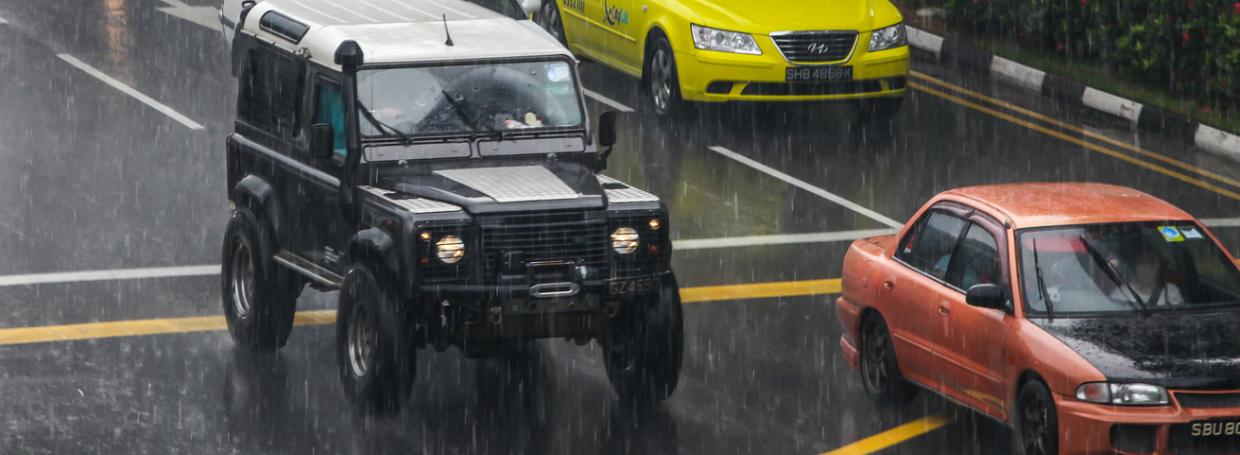What to do if Car Is Affected by Flooding in Singapore? - Things to do

What to Do When Your Car Is Affected by Flash Flood
Reading time: 5 mins
Introduction
As a Singaporean, you might have witnessed flash floods locally and their impact on roads and travel. Have you ever worried about your car getting stuck in one and how much damage it could cause to your car? How can you mitigate the risk of any damage to your car when it gets filled with water because of a flash flood? We have put together a list of things you should do when the water has flooded your car.
Do you know what is worse than rainwater getting into your car? Saltwater. Saltwater is highly corrosive and damages car parts terribly, and sometimes to a point, becomes irreparable.
What Can Water Do to A Flooded Vehicle?
Electrical Malfunction
If water has seeped into the electrical system of your car, try not to touch anything and get out immediately to avoid the risk of an electric shock.
Rusting
Rainwater is not freshwater; it comes with chemicals that affect the body, the undercarriage, and all other exposed metal surfaces of the car. Rusting is one of the key signs of a flood-damaged vehicle (especially if the car was not cleaned and dried out properly).
Malfunctioning Moving Parts
Parts like the brake, clutch, and accelerator are usually the first part of the vehicle to get damaged in floods. Other mechanical parts, like the cylinders, pistons and starters, can also be damaged.
Hydrolock
This is the worst thing that can happen to any flooded car; this is when water gets into the engine through the air intake. The piston and combustion cycle are affected, and mechanical complications occur.
If you are wondering what steps to take when your car has been impacted by a flood, read on.
What You Should Do immediately After You Find Yourself Stuck In A Flood:
Step 1: Do Not Turn on The Car’s Ignition
Trying to start your car when it is tyre-deep in water will damage your vehicle even more and cause it to hydrolock. Call a tow service to get your car out of the water or push it out yourself.
Step 2: Disconnect the Battery
To salvage some electronics in the car, disconnect the battery, take it out of the vehicle, clean the battery terminals and leave it out to dry. It will not only save your battery but avoid the risk of an electric shock. Read this article to learn how to disconnect your battery yourself.
What You Should Do After You’ve Gotten Your Car Out of The Flood:
Step 3: Evaluate the Extent of The Damage
Evaluating the damage helps the car insurer to determine the options that are available for you. Check the engine oil using the dipstick. If you can see water in the oil or water in the air filter, call a mechanic (preferably from your insurer’s authorized workshops) to do a thorough servicing of your car.
Step 4: File A Claim
The quicker you file a claim, the better for you. Infact, all accidents are to be reported within 24hours Taking pictures of the car in the flood helps validate your claim. Take pictures before calling your insurer’s tow services.
If you are on the Comprehensive insurance policy, you are lucky because this policy covers flood damage. Make sure you file your claim quickly.
Step 5: You can have your car thoroughly cleaned and dried
Your car has absorbed a lot of water, there’s water in the seats, on the floor carpets; water is everywhere! Use a dry/wet vacuum to absorb all of it. If you do not have a vacuum, use towels—lots of them—to soak up every drop of water. Leave the door open and let the sun do the rest.
If you have successfully dried out your car, chances are it will leave behind watermarks and odour. Use an upholstery cleaner or take your car to a wash to get it cleaned thoroughly.
Final Thoughts
The cost of repairing flood-damaged vehicles can be expensive, and worse, having to replace the car at your own expense can be emotionally and financially overwhelming. It is unforeseeable events like this that we appreciate the value of car insurance.
Buying a Comprehensive insurance plan helps - covers you and your vehicle when incidents such as flood happens.
If you have further questions on this topic, please let us know in the comments below for us to help.
